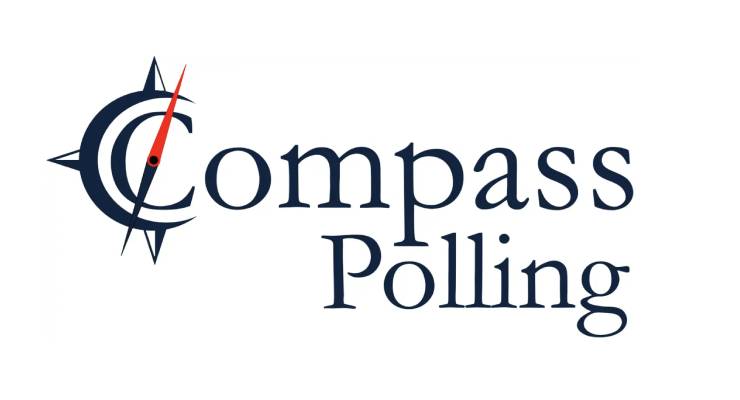
Two-thirds of Australians don’t want trans women to compete in women’s sport, according to Kirralie Smith, spokeswoman for anti-LGBT group Binary.
Three in four believe that too much of the Australian way of life is being “sacrificed to political correctness”, says Menzies Research Centre executive director Nick Cater.
And 60% of Australians think that religious schools shouldn’t be forced to employ staff who are “in conflict with the school’s statement of faith”, the Australian Christian Lobby’s managing director Martyn Iles claims.
What do these three statistics have in common? Beyond being favourable survey results used by conservative leaning public institutions to try to influence Australia’s politics, they all come from the same place: Compass Polling.
Who or what is Compass Polling?
There’s not much public facing information about Compass Polling. Its website has scant detail beyond promoting itself as “Australia’s fastest premium polling”. There are no listed staff or ways to contact it beyond email.
References to it in Australian media started in September. According to Google’s News search, it has been cited four times by name in The Australian. There’s little information about how its polling is conducted either. None of those examples go into detail about its methodology.
Whether a poll was conducted online, by phone, email or in person can drastically affect the reliability of its results. Disclosing this information is best practice as it allows readers to interpret the results. It’s one of the standards in the code of conduct for the Australian Polling Council, a group to which Compass Polling does not belong.
A document shared by the Australian Christian Lobby on its Compass Polling results says the survey’s sample was drawn from PureProfile, an Australian-based online market research company. It’s not clear how it finds its survey respondents and what methods it goes to ensure a representative sample, although it does mention weighting by 2016 census demographics.
According to the Australian government’s Australian Business Register, the business name was registered in September for True North Strategy Ptd Ltd. True North Strategy has two directors, Ian Lindsay Smith and Dorian Felix von Freyhold, and was set up in November 2020.
Von Freyhold’s LinkedIn profile lists him as a managing partner of Frontier Pricing and he has frequently appeared on Sky News Australia to talk about his research.
Neither von Freyhold nor Compass Polling immediately responded to questions about the firm.
True North Strategy gained attention in March for a polling result that claimed a majority of Australians “wouldn’t pay a single cent” for a subscription to the ABC based on an online survey of 500 people, as reported by the Guardian Australia’s Josh Taylor.
It’s not clear why the pair changed the company’s name, but a similarly named firm, True North Engagement, had to issue a statement following the March article in The Australian which mistakenly named it as the responsible firm.
“True North Research conducts professional and meaningful research that informs. We work exclusively on an impartial and confidential basis,” it said.
Polling is an important tool in politics because it can give insight into public opinion, if conducted correctly. If it’s conducted poorly — leading questions, small number of respondents, unrepresentative samples — polling is like a misprinted map: it will lead you in the wrong direction.
Compass Polling’s opacity means its results are at best unhelpful or, in the wrong hands, able to be used in a way which is actively deceptive about what Australians are really thinking.








Compass Polling is just what we need to go with the existing outfits who, on demand, manufacture reports to confirm whatever nonsense the client wants, dressed up to look like independent research from a respectable institute. It’s a great contribution to what Steve Bannon called flooding the zone with siht, and it’s no surprise to see The Australian is helping it along.
Who’s to say Compass Polling actually does polling. For all we know they could just make stuff up to suit their and the Liberal party’s agendas.
To get anything published in the peer-reviewed scientific literature, a team’s data and methodology must be publicly available.
Not so anything from disclosure-averse Morrison.
Given the absence of insightful information about the doings of Compass Polling, one immediately becomes aware that Australia’s Public Interests Disclosures Act 2013; (the Act) promotes accountability and integrity in the Commonwealth public sector by encouraging the disclosure of information about suspected wrongdoing, supporting and protecting disclosers from adverse consequences and ensuring that public interest disclosures are effectively A lawful Federal government-supported initiative.
The Disclosures mentioned in the above Act requires Compass Polling to publish its origins, the name of its Chief Executive, who. is responsible for that person’s role to ensure Compass Polling compliance does meet their obliged expectations.
The content of this Crikey.com information article demonstrates the failures inherent within the entity known as Compass Polling.
The listed information held in this article is to bring to the awareness of Australia’s people the specific failures and the digressions as to the bonafide’s of Compass Polling to honourably and independently serve in the best public interest.
In the unlikely event that Compass asked human beings anything, what chance that it was NOT push-polling?